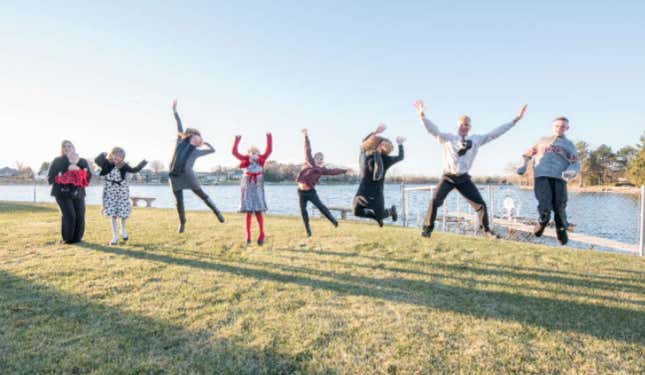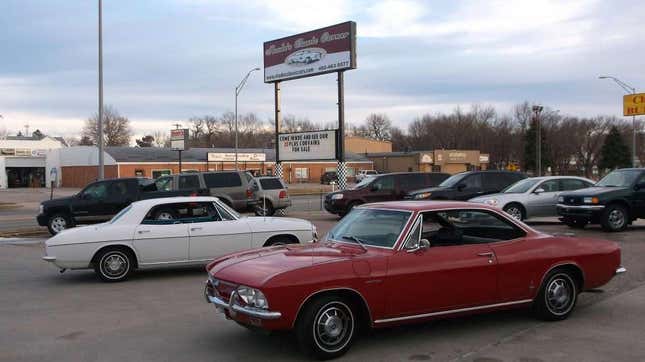
For Chris Shade, the Chevy Corvair is more than just a car or his business. It’s his family. I mean that literally. Without the Corvair, Shade’s family – and life – would be far different.
He was first introduced to General Motor’s ill-fated rear engined car in 1972 when his father bought his first of many. That car remains with his family to this day.
Shade immediately fell in love with the car.
“I wrote papers on them in high school,” Shade said. “My senior year, my paper was on the Corvair Yenko.”
Shade started out as a music and band teacher, but later fell out of love with the job and looked to pivot to something new. He said he was an “all or nothing” type of person, so he decided to go all in on a car lot – combining his two loves: cars and his family.
That’s when the first iteration of Shade’s Classic Cars came to fruition about 19 years ago in 2003. By 2010, the Corvair bug had come back at full strength.
It all started with a phone call from a friend who said there was a barn full of seven cars, an enormous amount of parts and 22 engines not far from where he grew up in Nebraska.
He then started taking parts to conventions and swap meets.
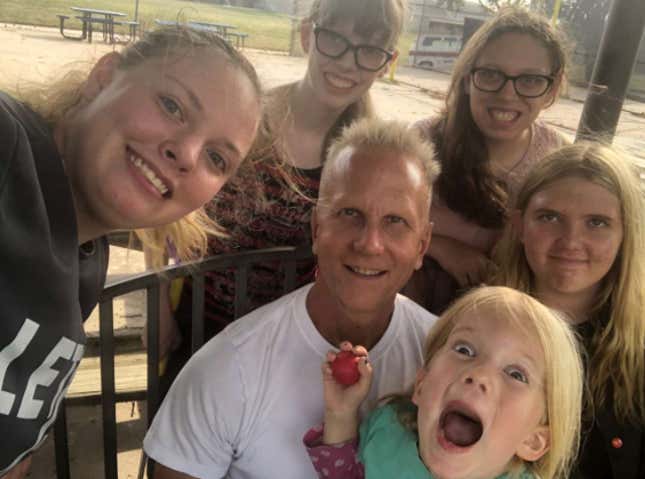
“I took parts to the conventions. My family, and I went to Corvair conventions all of the country. It gave us a chance to travel a lot, sell some parts. And I pick up a car here and there. And next thing you know, I sold it fast and made some money,” Shade said. “And, I was like, dang. So I started looking for more Corvairs.”
Buying and selling isn’t all Chris does though. He also has quite the business of restoring cars that are sent to him from all over the country. In fact, as Chris and I spoke, he was on his way to pick up a Corvair in Iowa.
By 2015, Chris said, he was “rolling.” A big part of that had to do with a personal car Chris owned – a Corvair Yenko Stinger that he picked up as a “bucket of bolts.” Over the years him, his team and his family restored it to what would eventually be a 98 point concourse car. That’s when people really started to pay attention to what he and his shop were doing.
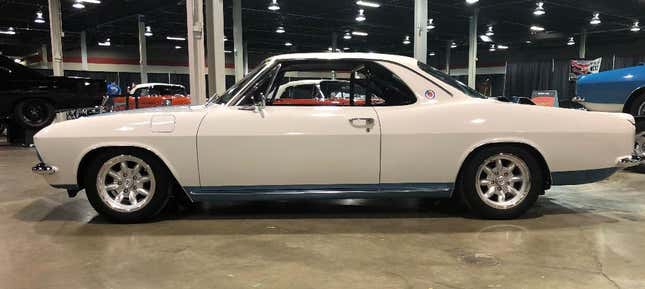
“I had a guy that I talked to for several years at the convention that could never remember my name. Well, ironically, they remember my name after that,” Shade said. “It created a halo effect, if you will, for our business a little bit. Cause it’s like, oh, you got a Stinger.”
That was around 2017, and when Chris said the business was finally “over the hump.”
Momentum has only been taking them farther and farther since then. 2020, as the whole world shut down, was Shade’s Class Cars’ best sales year ever. They’ve averaged about 42 car sales a year, plus a number of restorations and general Corvair repairs. But, in 2020 they sold 56 Corvairs – a big jump for such a small operation.
While Chris’s main focus is the Corvair, he doesn’t just have a one track mind. Pop over to his website and you’ll see a few examples of another General Motors oddity – the Pontiac Fiero.
“I’ve loved Fieros ever since the early ‘90s. I’ve always liked them because they’re outside the box for GM. And of course, you know, they’re the closest brother or sister to the Corvair,” he said.
He sort of thinks about them as a backup that he’d like to grow if the Corvair business ever started to fade, but luckily for him, he hasn’t had time to grow the Fiero side of things; his Corvairs sell so well. He owns three Fieros himself, including a 1987 Fiero out of which he ripped its infamous Iron Duke four cylinder. In its place is GM’s inimitable 3800 supercharged V6.
For a man so into GM’s oddballs, you may be surprised to find out what else Chris has had in his personal collection. The key word: Japan. Some of the highlights of his collection have included an FC Mazda RX-7, a 1991 Nissan 300ZX twin-turbo, a 1987 Toyota Supra Turbo and a 1995 Honda NSX and a Mitsubishi 3000GT VR4. Not too shabby.
Lucky for Chris, his wife, Stephanie, was just as into Corvairs as he was. Her passion for Corvairs was probably only second to his.
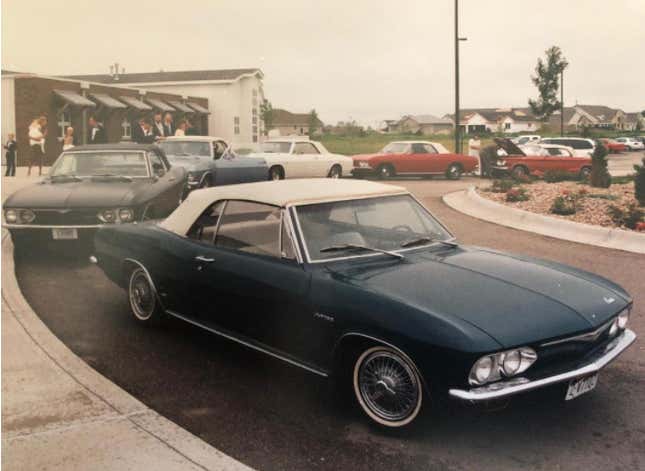
“We had many Corvair dates. I proposed with the Corvair. We had six Corvairs in our wedding.,” Shade said. “They drove away with our wedding party.”
According to his mother-in-law, if the Corvair had never existed, odds are the two would not be married to each other.
The family’s love of cars goes far beyond just him and his wife. The two of them have eight children – three are biological and five are adopted and disabled, according to Chris. Quite a few of them play a big role in the shop and have automotive passions of their own.
“My oldest son with autism loves Corvairs. And he comes to my shop every day, as long as he can stay there after he’s done with school, Shade said.”
His son even has a Corvair of his own – a Lakewood Wagon they’ve restored.
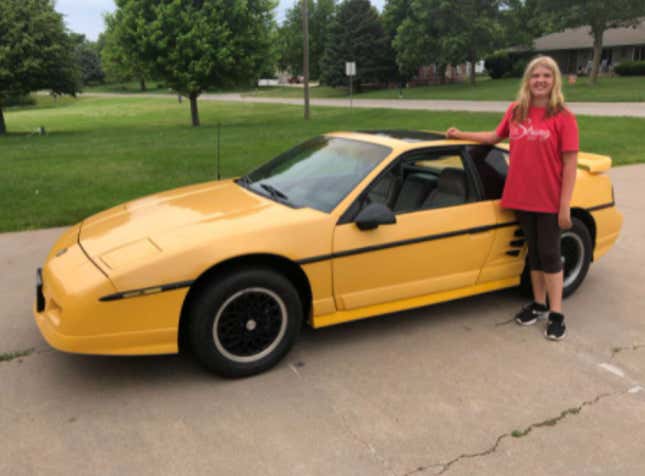
His 13-year-old son, Micah, has also turned into quite the gearhead. Even though he just entered his teen years, he has three cars of his own.
His eldest daughter, 15-year-old Corinne, has also followed in her father’s footsteps. She has her own Corvair Greenbrier that they’ve fixed up together as well as a bright yellow Fiero.
“My son – the 13-year-old will be coming down this summer to work for us. He’ll be stripping parts cars apart for us, and basically working off the debt for all the other cars he has that he owes me for ,” Chris said with a laugh.
What exactly goes into restoring a car that is nearly 60 years old? It’s a lot. That said, Shade’s Classic Cars keeps an eye on affordability. The shop does what Chris calls “budget restorations.”
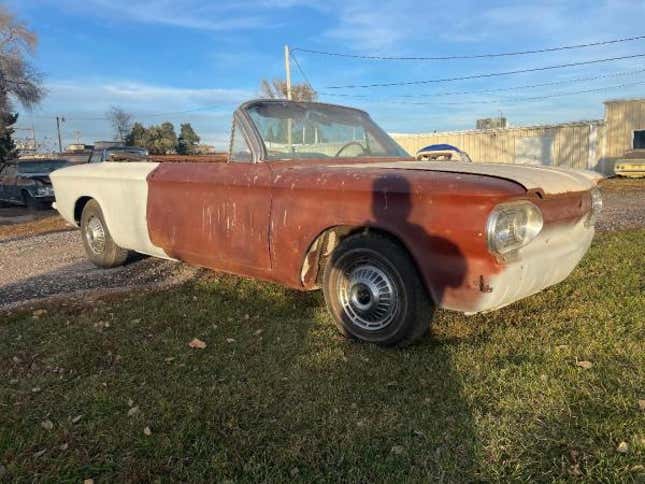
“The price of the car and the restoration is going to run you between 25 and $30,000,” Chris said.
And, while that isn’t exactly no money, it’s a hell of a lot cheaper than a rotisserie restoration like the one done on his Yenko Stinger. Something like that would easily break into the six figures. Shade says their goal is to create “nice drivers.”
“We’re not trying to create a concourse car, because most of our clientele wants nice drivers,” he said.
Apart from body work, they also do work on the engines and other mechanical aspects of the car , making sure they’re also ready to go for their new owners.
“As I tell everybody, they’re not perfect, they’re not new and you’re never done,” Shade said. “So we get them at a good point where we’re hoping they’re turn key and reliable. But, as you know, if you’re in the restoration, you’re never quite done.
A restoration like that will take about a year and a half on average, according to Chris. But, of course, if the client wants something a bit more high end, they will accommodate. All it takes is time and money.
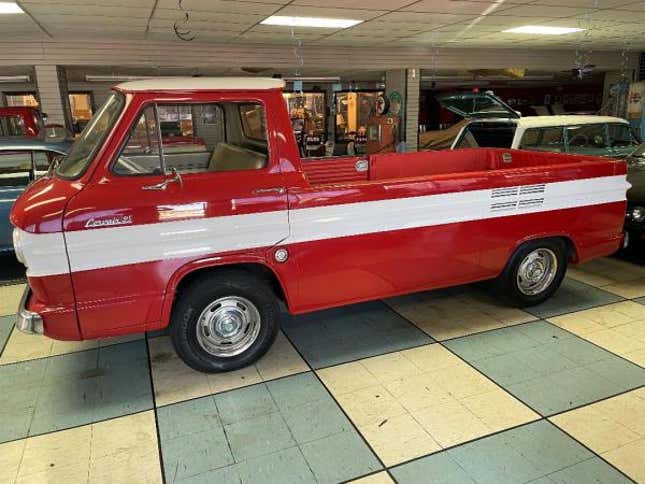
The shop’s bread and butter is the Rampside pickup. People end up using these trucks not only for personal use, but for their businesses. Because they’re so unique looking, the Rampside ends up being a good mascot for local businesses, according to Shade.
Economics are a big reason the Rampside is so popular. It’s hard to get around the fact a relatively rare Rampside will end up holding its value better than a relatively common standard four-door Corvair. That means there’s more room to restore the Rampsides.
Chris travels the country looking for good examples of these trucks, which can definitely be hard to find.
“Most of them are pretty rusty,” Chris said. “They were a cheap General Motors product that nobody thought twice about until about 10 years ago.”
The company slogan is “Buy a car, make a friend.” Buyers usually come along every step of the way in the restoration process. It’s a real collaborative effort.
Why the Corvair? What made it so special that this man would make his entire life revolve around it? After all, the Corvair, for the most part, was a rather middle of the road family car with one not so great claim to fame: Unsafe at Any Speed. However, Chris doesn’t put much stock in Ralph Nader’s infamous book
For Chris, what fascinated him most about the Corvair was its design innovations that set it apart from just about everything else in the early 1960s.
Turbocharging, unibody construction, and independent suspension were all revolutionary when General Motors, at the height of its powers, tried them out in the early 1960s, even if they seem rather mundane by today’s standards. The historical impact of the Corvairs goes far beyond what the car is known for by most people.
“History is so important in every aspect of life,” Shade said. “And that includes automotive history.”
